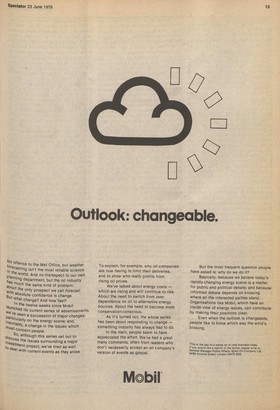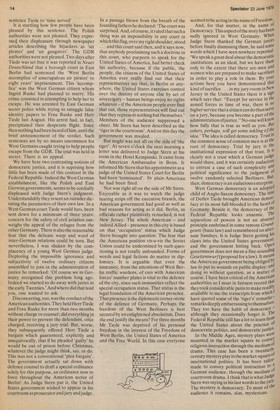Outlook: changeable.
No offence to the Met Office, but weather forecasting isn't the most reliable science In the world. And no disrespect to our own Planning department, but the oil industry has much the same kind of problem: about the only prospect we can forecast With absolute confidence is change. But what change? And how fast? In the twelve weeks since Mobil launched its current series of advertisements we've seen a succession of major changes, particularly on the energy scene; and, inevitably, a change in the issues which Most concern people. So, although this series set out to discuss the issues surrounding a major Investment project, we've tried as well to deal with current events as they arose.
To explain, for example, why oil companies are now having to limit their deliveries, and to show who really profits from rising oil prices.
We've talked about energy costs — which are rising and will continue to rise. About the need to switch from overdependence on oil to alternative energy sources. About the need to become more conservation-conscious.
As it's turned out, the whole series has been about responding to change — something industry has always had to do.
In the main, people seem to have appreciated the effort. We've had a great many comments, often from readers who don't necessarily accept an oil company's version of events as gospel. But the most frequent question people have asked is: why do we do it?
Basically, because we believe today's rapidly-changing energy scene is a matter for public and political debate; and because informed debate depends on knowing where all the interested parties stand. Organisations like Mobil, which have an inside view of energy issues, can contribute by making their positions clear.
Even when the outlook is changeable, people like to know which way the wind's blowing..
sentence Tiede to 'time served' It is startling how few people have been pleased by this sentence. The Polish authorities were not pleased. They expresse4 their displeasure through newspaper articles describing the hijackers as 'air pirates' and 'air gangsters'. The GDR authorities were not pleased. Two days after Tiede was set free it was reported in Neues Deutschland that a borough court in East Berlin had sentenced the 'West Berlin accomplice of unscrupulous air pirates' to eight years' imprisonment. This `accomplice' was the West German citizen whom Ingrid Ruske had planned to marry. His crime consisted in attempting to help her to escape. He was arrested by East German secret police while trying to smuggle false identity papers to Frau Ruske and Herr Tiede last August. His arrest had, in fact, precipitated their desperate flight. Since then nothing had been heard of him, until the brief announcement of the verdict. Such sentences are by no means uncommon for West Germans caught trying to help people escape from the GDR. The trial was held in secret. There is no appeal.
We have here two contrasting notions of democratic justice, and it is suprising how little has been made of this contrast in the Federal Republic. Indeed the West German establishment, like the Polish and East German governments, seems to be cordially displeased with Judge Stern's judgment. Understandably they resent an outsider dictating the parameters of their own law. In a West German court Tiede would havL been sent down for a minimum of three years: concern for the safety of civil aviation outweighs the appeal of the refugee from the other Germany. There is also the reasonable fear that the delicate warp and woof of inter-German relations could be torn. But nevertheless, I was shaken by the complacency of a young West German judge. Deploring the impossible ignorance and subjectivity of twelve ordinary citizens assembled to join in the administration of justice he remarked: `Of course we in Germany recognised this problem long ago. Indeed we started to do away with juries in the early Twenties.' And where did that lead you, one wanted to ask.
Disconcerting, too, was the conduct of the American authorities. They held Herr Tiede and Frau Ruske for more than two months without charge or counsel; did everything in their power to prevent the defendant, once charged, receiving a jury trial. But, worse, they subsequently offered Herr Tiede a bargain which guaranteed, explicitly and unequivocally, that if he pleaded `guilty' he would be out of prison before Christmas, whatever the judge might think, say, or do. This was not a conventional `plea bargain'. The government actually sat down with defence counsel to draft a special ordinance solely for this purpose, an ordinance now in force throughout the American sector of Berlin! As Judge Stern put it, the United States government wished to appear in his courtroom as prosecutor and jury and judge. In a passage blown from the breath of the founding fathers he declared: 'The court was surprised. And, ofcourse, it ruled that such a thing was an impossibility in any court in which this flag, over my right shoulder, stood . . . and this court said then, and it says now, that anybody proclaiming such a doctrine in this court, who purports to speak for the United States of America, had better check his authority, because if the public, the people, the citizens of the United States of America ever really find out that their representatives say that, in Berlin or anywhere, the United States exercises control over the destiny of anyone else by act of sovereignty — human beings enjoy no rights whatever —if the American people ever find that out, those representatives will find out that they represent nothing but themselves.' Members of the audience suppressed a cheer. Mr Stern has been described as the 'tiger in the courtroom'. And on this day the government was mauled.
But might was not all on the side of 'the tiger'. At seven o'clock the next morning a letter was delivered to Judge Stern at his room in the Hotel Kempinski. It came from the American Ambassador in Bonn. It informed Mr Stern that his appointment as a judge of the United States Court for Berlin had been `terminated'. In plain American he had been fired.
Nor was right all on the side of Mr Stern. Enjoyable as it was to watch the judge tearing strips off the executive branch, the American government had good as well as bad reasons for acting as it did. Berlin, as officials rather plaintively remarked, is not New Jersey. The whole American — and indeed Allied — presence in this city is based on that 'occupation' status which Judge Stern brought into question. The fear that the American position vis-a-vis the Soviet Union could be undermined by such questioning is not totally unfounded. Forms of words and legal fictions do matter in diplomacy. It is arguable that even the immunity, from the attentions of West Berlin traffic wardens, of cars with American forces' number plates is vital to the defence of the city, since such immunities reflect the special occupation status. That status is the legal foundation of the American presence. That presence is the diplomatic corner-stone of the defence of Germany. Perhaps the freedom of the West Berliners is best secured by an enlightened absolutism. Does the end justify the means? For three months Mr Tiede was deprived of his personal freedom in the interest of the Freedom of West Berlin, the United States of America and the Free World. In this case everyone seemed to be acting in the name of Freedom, And, for that matter, in the name 0' Democracy. This aspectof the story has been sadly ignored in West Germany. When Judge Stern thanked the German jurors before finally dismissing them, he said some words which I have seen nowhere reported: 'We speak a great deal about the democratic institutions as an ideal, but we have then only to the extent that there are men and women who are prepared to make sacrifices in order to play a role in them. By your actions here you have demonstrated that kind of sacrifice. . . in my jury-room in New Jersey in the United States there is a sign which says that: "Except for service in the armed forces in time of war, there is n0 higher service that a citizen can do than serve on a jury, because you become a part of the administration ofjustice." No-one will know how fully that is true as well as you. But others, perhaps, will get some inkling of the idea.' The idea is called democracy. Trust In the common sense of common men is at the root of democracy. Trial by jury is the institutional expression of that trust. It is clearly not a trust which a German judge would share, and it was certainly audacious to entrust a case of such complexity and, political significance to the judgment 01 twelve randomly selected Berliners. Bur' then, democracy is an audacious enterprise. West German democracy is an adopted child of Anglo-Saxon democracy. The trial of Detlev Tiede brought American demofacy at its most full-blooded to the heart 0I Germany. Beside it, the democracy of the Federal Republic looks anaemic. The separation of powers is not an abstract principle enshrined in some remote Grunt!' gesetz (basic law) and remembered on alternate Sundays. It is Judge Stern getting his claws into the United States government, and the government hitting back. Opell government does not mean a fine-sounding Gesetzentwurf(proposal for a law). It means the American government being obliged t') law to put its wounds on public display: arld, doing so without question, as a matter 0' course. I have been critical of the American authorities so I must in fairness record that they took considerable pains to make readilY available to me the transcripts from which I have quoted some of the 'tiger's' remarks remarks deeply embarrassing to themselves' They too have the habit of democracy although they occasionally forget it. The Federal Republic still has a lot to learn Iron} the United States about the practice. democratic politics, and democratic justice. In the Middle Ages, mystery plays were mounted in the market square to convq religious instruction through the medium '31 drama. This case has been a twentiethi century mystery play in the market-square° international politics. It has been tailormade to convey political instruction to 3, German audience, through the medium 01 courtroom drama. I think that is what Judge Stern was saying in his last words to the jurY' The mystery is democracy. To most of the audience it remains, alas, mysterious.











































 Previous page
Previous page